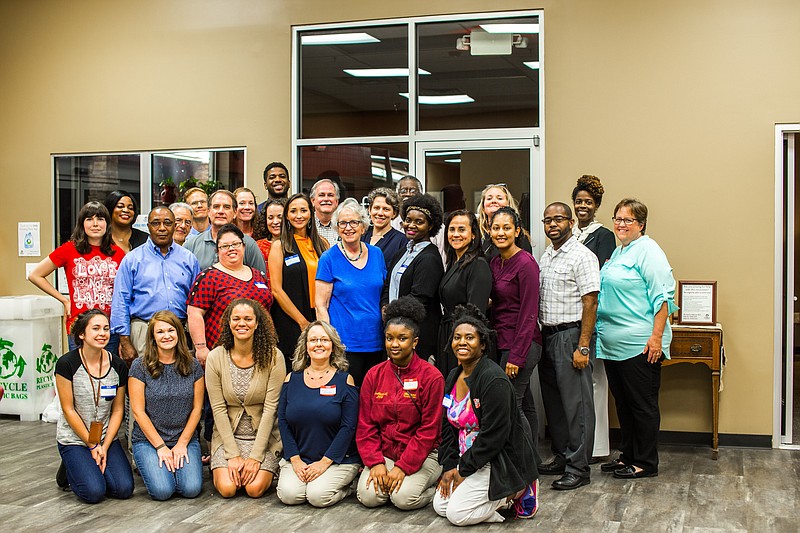Members of APEX project steering committee
District 1: Lisa Bolus, Suzanne Ness, Steve SlaterDistrict 2: Richard Graham, Annie Hall, Alayna BakerDistrict 3: Gladys Pineda-Loher, Jim Watson, Fran QuarlesDistrict 4: Frida Uwimana, Samantha Boucher, Lili ReynoldsDistrict 5: Jamie Petty, Michael R. Harris, Rodney JohnsonDistrict 6: Ariel Ford, Lorean Mays, Tara VilandDistrict 7: Jessica T. Phillips, Tamarah R. Daniel, Reginald GilmoreDistrict 8: Elizabeth Tallman, Kimberly Mathis, Cary GarrettDistrict 9: Marie Dean, Jennie Moreland, Rachel Turner
After sifting through a pool of more than 100 applicants, local nonprofit organization UnifiEd has chosen 27 community members to aid in its efforts to promote equity throughout the county's 79 public schools.
The announcement comes as the next step in the education advocacy organization's Action Plan for Educational Excellence, or APEX, project. Launched in August with a series of discussion-driven "EdTalk" gatherings, the project aims to craft a policy to ensure all Hamilton County Schools students have the resources they need to succeed, regardless of socioeconomic status. The completed policy will be submitted to elected officials in the hopes of implementation.
The 27 citizens selected will help lead that effort by serving as the APEX project's steering committee, made up of three representatives from each of the nine commission districts in Hamilton County.
"Our steering committee is comprised of an amazing group of community leaders who represent all geographic areas of our diverse county," said Ashley Conrad, director of policy and research at UnifiEd. "These parents, teachers, students and city and county leaders will be working together to share their expertise and ensure transparency and accountability throughout the creation of the policy platform."
Over the next few months, committee members will ensure the demands included in the equity policy platform fully represent the ideas and experiences of residents in their districts, as well as the county as a whole.
The group will work toward that goal by facilitating conversations and EdTalks within their communities to determine citizens' priorities; sharing their experiences with inequities with other members of the committee; learning about the school system and visiting county schools; and working alongside UnifiEd to generate student-focused solutions to be built into the policy platform, which is expected to be released in February 2018.
Rachel Turner, who teaches at Hamilton County High School and helps represent District 9 on the steering committee, said one of the most critical disparities she sees among schools in her district is access to effective teachers.
According to the Tennessee Department of Education, almost 30 percent of Hamilton County's teachers were ranked as "least effective" on overall classroom effectiveness during the 2014-2015 school year. The state average for "least effective" teachers within each school district that year came in at 11 percent. The scores, which range from "least effective" to "highly effective," are based on a school-level evaluation score, the growth of each teacher's students over the academic year and a self-selected achievement measure.
A large portion of the Hamilton County teachers who fell into the "least effective" category were in schools with the highest concentrations of economically disadvantaged and minority students.
One such example locally was Bess T. Shepherd Elementary School. More than 90 percent of the school's students were qualified as poor in 2015, statistics show, and 74 percent of its teachers were ranked as least effective.
Comparatively, 38 percent of Ooltewah Elementary School's students were poor in 2015, while 5 percent of its teachers were ranked as least effective, with more than 75 percent of its teachers being considered highly effective.
"These issues must be acknowledged and addressed in order to ensure that every student has an equal chance in life," Turner said.
Still, ending education inequity won't be the work of just one committee, but rather the entire community, said steering committee member Annie Hall, formerly a member of the Hamilton County Board of Education. She urges everyone to stay informed on the issue and get involved, whether through conversations with the APEX steering committee or other methods of advocacy outside UnifiEd.
"We can put Hamilton County on the map as a community with outstanding schools where everyone is a stakeholder in the academic success of every single student," said Hall, who helps represent District 2 on the steering committee. "I believe it is past time for our community to resolve the equity issue which has kept too many of our students from being successful in school. I applaud UnifiEd's commitment to address and resolve this issue once and for all."
Once the equity policy platform is made public, UnifiEd and the committee will begin their push to persuade the school board, the Hamilton County Commission and the Hamilton County Department of Education to implement it.
Contact Myron Madden at mmadden@timesfreepress.com or 423-757-6423.
